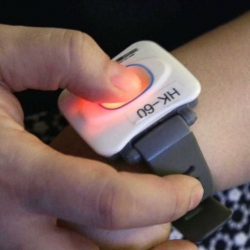
The panic buttons were part of the recent collective bargaining agreements between the Culinary Workers Union, Caesars, and MGM Resorts.
Thousands of Las Vegas casino workers now carry “panic buttons” with them so they can warn management of sexual harassement and other dangerous situations. The 50,000-member strong Culinary Workers Union of Las Vegas negotiated the panic buttons for members in recent labor negotiations.
When the workers voted 99% to 1% to authorize a strike on May 22, one of the negotiating points was protections from harassment by customers for housekeepers and cocktail servers. For employees of Caesars Entertainment and MGM Resorts casinos, panic buttons are the product of their new 5-year collective bargaining agreements.
36,000 workers are covered by the new contracts. That means housekeepers, bartenders, and cocktail servers at famous casinos like MGM Grand, Bellagio, Mandalay Bay, the Mirage, and Caesar’s Palace will carry devices which will allow them to summon security when they feel endangered.
Sexual Harassment in Casino Jobs
Vox noted that workers in the service industries are at high risk for harassment, including sexual harassment. A hostile work environement can be the result of the longstanding philosophy that “the customer is always right”, along with large amounts of alcohol consumed.
In a May 2018 survey of 10,000 casino workers, 59% of cocktail servers and 27% of housekeepers said they had been sexually harassed by hotel/casino customers while on the job. Since the #MeToo Movement launched in the fall of 2017, more workers have been pushing for protections against sexual harassment.
The Culinary Union took their members’ complaints to heart. Maria Landeros, a housekeeper at the MGM Grand, told union leaders, “We are here to do our jobs and provide incredible, world-class customer service for our guests. We are not here to be abused or have people think that just because it’s Las Vegas anything goes.”
Allegations in the MeToo Era
The case of Steve Wynn’s alleged misconduct put a spotlight on the treatment of casino employees. In January 2018, Wynn Resorts founder and CEO was accused of harassing dozens of his resort’s salon workers over the years in a Wall Street Journal report. Though Steve Wynn denied the allegations, sustained media coverage and a widening number of accusers led to his resignation in early February.
The casino industry faces a whole new era. Workers can take their complaints to social media platforms like Twitter and Facebook, while they have the ability to record sexual harassment using smartphones. Beyond that, in the era of the MeToo Movement, their accusations are more likely to be treated seriously.
Avoiding EEOC Complaints
MGM Resorts and Caesars Entertainment, two Las Vegas Strip giants which have long histories of working well with labor unions, decided to be proactive and offer the panic button. Not only is the panic button good public relations, but it also protects workers while covering the companies in regards to harassment lawsuits.
It is good business. While much of the focus of the MeToo Movement complaints have been in the Hollywood movie industry, casino workers have been on the forefront of sexual harassment complaints over the years.
From 2005 to 2015, over 5,000 casino workers filed complaints with the Equal Employment Opportunity Commission. That is more than any other industry in the United States. As Maria Landeros stated, spending vacation time at a destination resort known for the slogan “What happens in Vegas stays in Vegas” might give visitors impression they can push the boundaries.
Westgate Las Vegas Resort & Casino
The panic button appears to be here to stay. The Las Vegas Fox News affiliate reported that the Westgate Las Vegas Resort & Casino, which is still in negotiations with the Culinary Workers Union, has ordered panic buttons for their employees.
